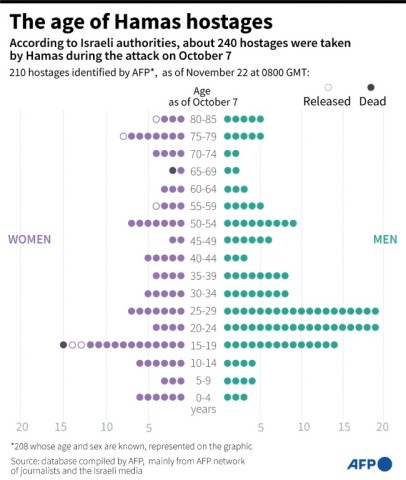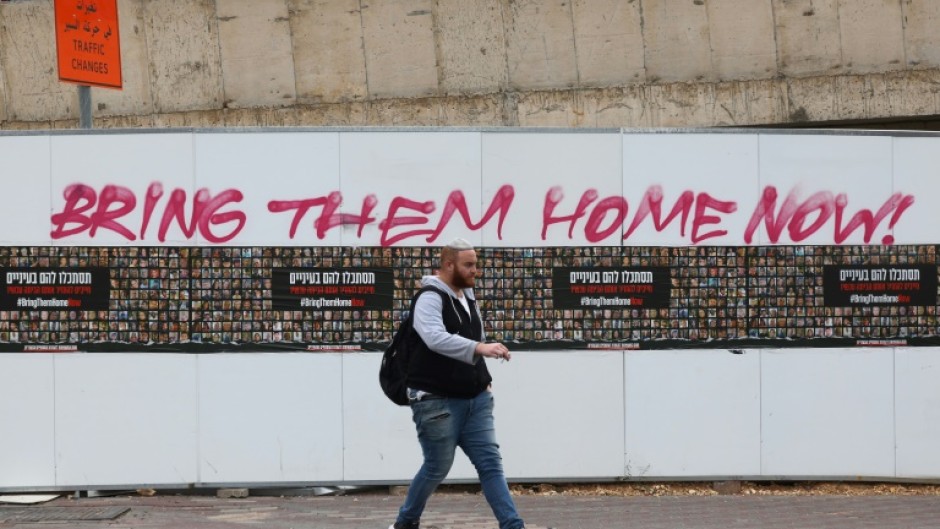Israeli and Palestinian families were torn between hope and fear Wednesday following an overnight deal to free hostages held by Hamas in Gaza in exchange for Palestinian prisoners held by Israel.
Under the terms of the deal, Palestinian militants will release 50 hostages, all women and children kidnapped during the October 7 Hamas attack on southern Israel, in exchange for the freeing of 150 Palestinian prisoners, made up of women and teenagers.
But beyond the fact they would be released at a ratio of three prisoners for every hostage, little is known about how and when they would be freed -- although it will happen during a four-day pause in the fighting.
Israel has published a list of 300 prisoner names eligible for release, but no such information has been released by Hamas, sparking a welter of emotions on both sides.
"We are very happy that a partial release is pending," said the Hostages and Missing Families Forum which represents the 240 or so people snatched on October 7, among them women, children and elderly people.
"As of now, we don't know exactly who will be released when."

There are at least 35 children among the hostages, 18 of them aged 10 and under, according to an AFP count, as well as more than 50 women.
"We don't know who will get out because Hamas will release the names every evening of those who will get out the next day," said Gilad Korngold, whose eight-year-old grandson Naveh and granddaughter Yahel, three, are among seven family members held captive.
"We don't know anything but we have to stay at home. That's what they told us," he told AFP, the tension evident in his voice.
"Until I see them with my own eyes, I won't believe what anyone says."
The most prominent Palestinian prisoner on the Israeli list is Israa Jaabis, 38, who was convicted of blowing up a gas cylinder in her car at a checkpoint in 2015, wounding a police officer. She was sentenced to 11 years in prison.
Her sister Muna told AFP that even though she was named in the document, the family did not know "whether they could release her and deport her, or what her fate will be".
And the violence of the Israeli operations in the Gaza Strip meant their emotions were mixed, she added.
"We try to accept the idea that all these detainees were released after thousands were killed, but it is difficult and the joy is stained with blood."
- 'Pain in my heart' -
The hostages have become a focal point of Israel's massive military campaign in Gaza after Hamas militants stormed across the border on October 7, killing 1,200 people, mostly civilians and snatching hundreds of others in the worst attack in Israel's 75-year history.
Since then, Israel has vowed to destroy Hamas and hit Gaza relentlessly, with the Hamas-run government saying more than 14,000 people have been killed, two thirds of them women and children.
One Palestinian mother from annexed east Jerusalem said she was delighted her daughter was coming home after serving half of her 16-year sentence in an Israeli jail, but admitted she had "mixed feelings" over the high price that secured her release.
"I cry, laugh, and tremble... I had hoped that she would come out in a deal, and this year I kept imagining her walking through the front door," Sameera Dwayyat said of her 26-year-old daughter Shruq.
"At the same time, there is great pain in my heart. I wish she had been sentenced for 10 more years and we hadn't lost a single child in Gaza."
On the list of prisoners slated for release are 33 women, 123 boys under 18, and 144 young men aged 18. All are from the occupied West Bank or east Jerusalem and none had "blood on their hands", Israel has said.
In Tel Aviv, supporters of the hostage families expressed relief at the breakthrough but shared deeply mixed feelings that the deal did not involve all those who had been abducted.
"We are happy for everyone who is being released, but we're still thinking about all the people who are left behind," 42-year-old teacher Marva Tovia told AFPTV.
"It's really heartbreaking, I feel torn."

